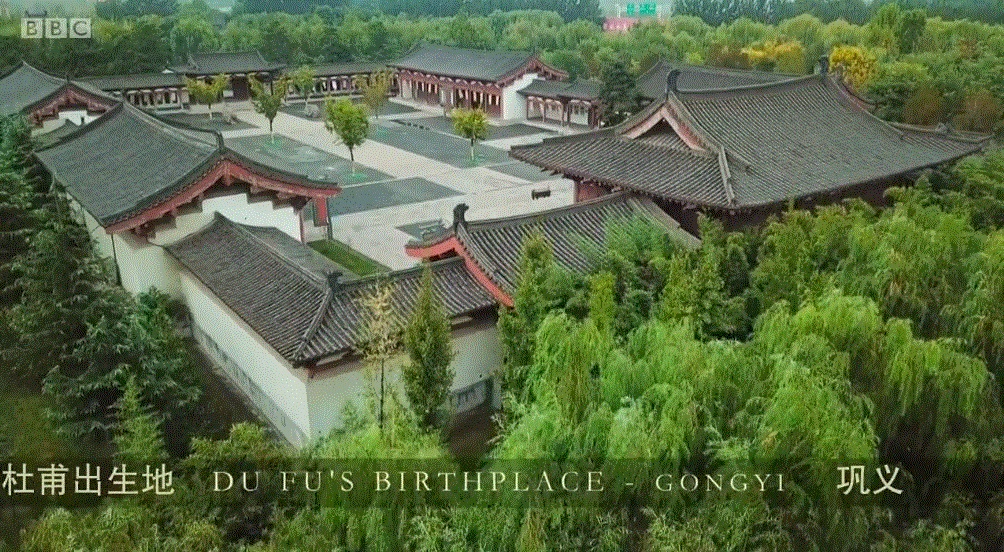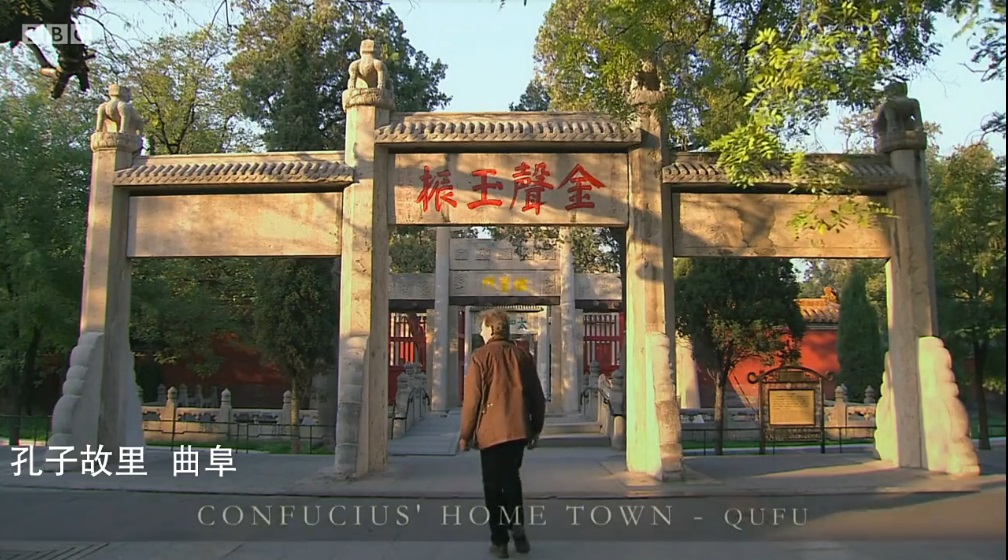来源:BBC纪录片频道(A/B/Y站均有资源);

Voiceover:In our time,right across the planet the past is receding from us at an ever-faster rate and that's especially so here in China,but the travelers searching for the meaning of China's ancient culture can still find it in China's present.For here running under the surface are deep currents still shared by all Chinese people and among them is one great stream that has sustained the Chinese across the ages:their poetry.
Michael Wood(该纪录片撰稿人、主持人):China has the oldest living tradition of poetry in the world,more than 3,000 years old, older than Homer's Iliad(《荷马史诗》) and Odyssey(《奥德赛》) .For the Chinese,poets have always been the ones who most truthfully express the feelings of people.To Chinese that greatest poet is Du Fu.
Wood:Du Fu lived in the 18 century,the age of Beowulf(贝奥武夫) in Britain.It was the Tang Dynasty,a time of extraordinary cultural accomplishment that ended in horrendous warfare and the death of millions.Out of that suffering,Du Fu created his art.
Stephen Owen[宇文所安](哈佛大学教授):Du Fu belongs to a very special category.We have Dante Shakespeare and Du Fu. These poets create the very values by which poet is judged.
Voiceover:In the East,he's one of the Immortals in the West,few people have even heard of him.This is a journey in the footsteps of China's greatest poet.
Wood:Du Fu was born into China's greatest epoch:the Tang Dynasty.At the time of his birth the Tang had ruled for a century from their capital Chang'an,today's Xi'an.It was the greatest city on earth,with more than a million people.Rich,powerful and open to the world.For the Chinese that time was their golden age.The catalyst for it all was the Silk Road along which people,goods and ideas flowed from India,Iran and Central Asia into the crowded streets of the capital.
Wood:The Tang was a cosmopolitan Empire of many cultures and languages.In its markets you could find a dazzling mix of foreign fashions and food.And Du Fu's extraordinary life story would be entwined forever with the tale of this city and the fate of Tang China itself.Only a year after Du Fu was born,a new emperor came to the dragon throne XuanZong who was nicknamed The Brilliant(唐明皇).The Emperor would oversee China's most glorious period of culture and above all its greatest age of poetry.For the Chinese people it's poetry which gives the truest history of the human heart.
【中国受访人均以汉语讲述,括号后是纪录片的译文】【后续同类型亦采用相同格式】
曾祥波(中国人民大学):中华民族是一个比较注重历史记载的民族,那么杜甫的诗歌呢,是诗歌当中结合历史结合的最好的作品,同时这个记录还把他个人生活史和个人的精神史也记录在了诗篇当中。(Chinese people really value the recording of history. And Du Fu is better than anyone at reflecting that history in his poetry. That's because historical events are mirrored in Du Fu's own life and spiritual journey.)

Voiceover:The Du family were an old upper-middle class clan of officials and poets. In Imperial China, the two went together. You couldn't be a Mandarin without proving your literary skills.The family house is long gone. This is all that left. But tradition says that he was born here in the room. His mother died when he was an infant and he was brought up by his aunt, whom he adored. And that brings us to a first mysterious story.
Wood:When he was a baby, this region was struck by plaque and people were dying everywhere. And one day, a sorceress, a shamaness, came to the house and looked into the bedroom and two babies were asleep in the room --- the son of the aunt and little Du Fu. The sorcerous prophesied that only one of these children would survive and the child had to be sleeping in the south-east corner of the room. The aunt took her child out of that corner and put Du Fu there. For that reason, said Du Fu, my aunt's son died and I lived.
Voiceover:So maybe, even as a child, he felt as if he had the mark of destiny on him. More than 1,400 of his poems survive, a uniquely intimate autobiography.Years later, as an old man, he wrote the story of his childhood and youth in a poem spoken by Ian McKellen.
《壮游》
My Brave Adventures
七龄思即壮,开口咏凤凰。
When I was still only in my seventh year, my mind was already full of heroic deeds.
My first poem was about the Phoenix, the harbinger of a reign, a new age of wisdom.
九龄书大字,有作成一囊。
When I was in my ninth year, I had already written enough poems to fill a satchel.
往昔十四五,出游翰墨场。
At 14, I first began to read my poems in public.
斯文崔魏徒,以我似班扬。
The literary masters compared me to the great writers of the past.
性豪业嗜酒,嫉恶怀刚肠。
I was temperamental and I was already over-fond of wine.
I needed it to soften an uncompromised hatred of weakness and hypocrisy.
脱略小时辈,结交皆老苍。
I associated only with wise old grey heads.
饮酣视八极,俗物都茫茫。
Exhilarated by wine, we cast our glances over entire universe and all vulgar worldliness dwindled into oblivion.
Wood:I found that portrait of the artist as a young man written by the older Du Fu really authentic. He obviously felt even by the age of 14 that he was different from his classmates and his contemporaries. Maybe also already looking at the world as it ought to be rather than it actually is.
Voiceover:And as for his early inspirations, over 50 year later, he tells a story from his childhood. How as a five-year-old boy he was taken to see a great dancer and was overwhelmed by her magic.
《观公孙大娘弟子舞剑器行》
On Sensing the Sword Dance
余尚童稚,记于郾城观公孙氏
I remember when I was still a child aged five, I saw the famous dance Gongsun perform the sword dance.
观者如山色沮丧
Watching her, you felt heaven struggling against the Earth.
霍如羿射九日落
When she bent back, you saw nine suns falling, shot down by Yi, the god of archers.
矫如群帝骖龙翔
When she leapt, you imagined gods astride flying dragons in the clouds.
来如雷霆收震怒
When she advanced, you expected thunder and lightning from a gathering storm.
罢如江海凝清光
And when she stopped, you saw a soft light over a vast, calm sea.
Voiceover:For Du Fu, it was an unforgettable image of creative freedom and passion in which the dancer became a metaphor for all art, whether calligraphy, painting or poetry.In the later teens, the family were rich enough to allow him to go traveling. China then was at the height of glory under the brilliant emperor.
“Those days,” Du Fu wrote. “Rice was succulent, the granaries were full and not a robber on the road in all the nine provinces of China.”(稻米流脂粟米白,公私仓廪俱丰实。《忆昔》)No other civilization in the world was so refined or so cultured.
Voiceover:Traveling across the empire, Du Fu gathered stories, visiting the legendary sites of heroes and dragons, immersing himself in China's ancient traditions. Like any tourist today, he admired the famous monuments. “The greatest Buddhas of Longmen,” he wrote, “in their giant gorge cutting through the countryside where every vista reveals gold and silver Buddha temples.”(龙门横野断,金银佛寺开。《龙门》)

Voiceover:But for Du Fu, there was one special place of pilgrimage – QuFu, the birthplace of the philosopher Confucius. Born over a thousand years before Du Fu's Day, Confucius had shaped the core values of Chinese civilisation. For him, the main goal of life is social harmony and stability under a virtuous ruler. And each person has a role to play in helping the emperor achieve that common good.
Wood:The teachings of Confucius were Du Fu's guiding principles all his life – virtue, benevolence, service to the state. In a sense, you could say that like much of the Chinese political tradition from ancient times even to today, his thought was utopian.

Voiceover:So he went to the capital, Chang'an, today's Xi'an, expecting to become a government official. It was his chance to serve the brilliant emperor and help to continue the new age of wisdom.
Wood:Chang'an, the city pf peace. Along with Constantinople and Baghdad, it was a world city in the 18 century, the symbol of all that human civilization had to offer. And this place had a powerful presence in Du Fu's imagination all his life. It was the dream of success and power and fame, which one day he hoped he would achieve. And in his early twenties, he came here to sit the imperial examinations, confident that a glittering career lay ahead of him.
《奉赠韦左丞丈二十二韵》
Verses to Minister Wei
甫昔少年日,早充观国宾。
In the prime of life, I was sent by home prefecture to sit the state examinations.
赋料扬雄敌,诗看子建亲。
I feared no rival among the competing scholars, nor any difficult question that might be put to me.
自谓颇挺出,立登要路津。再使风俗淳
I thought, of course, that I was extraordinary and should immediately climb to the top and restore the purity of culture and civilization.
此意竟萧条
But unfortunately, the board of examinations thought otherwise. They failed me.All my hopes were shattered.
Wood:What does he fail, do you think?曾详波: 没错,这的确是一个重要的问题,许多学者进行过讨论。我想关键的原因是,比较有说服力的说法是洪业提出来的。洪业认为他可能涉及到那一年的的科举考试的一个风波当中。这次风波涉及到当年考试的很多考生。杜甫当时被卷进去了。这与他考试的才能关系不是很大。这个是第一个解释。第二个是比较通常的解释。杜甫写实的才能和他写文章的才能是不匹配的。他主要才能在写诗。(Yeah, A most important question. Many scholars discussing about this.The most convincing explanation was by the author William Hong. He thinks that Du Fu was caught up in some kind of scandal that affected many students that year. His rejection had little to do with his exam results. The other explanation is that Du Fu's talent for poetry was greater than his ability to write for the imperial examination. He was too much of a poet.)
Too much of a poet and not enough of a bureaucrat -- that would be his problem. The examinations were the path to wealth and status and exam failure cut him loose from the career ladder. So for a while, he wandered, picking up jobs where he could and hating himself for living on the coat-tails of the rich.
《壮游》
My Brave adventures
放荡齐赵间,裘马颇清狂
The next few years, I played and roamed.
春歌丛台上,冬猎青丘旁
